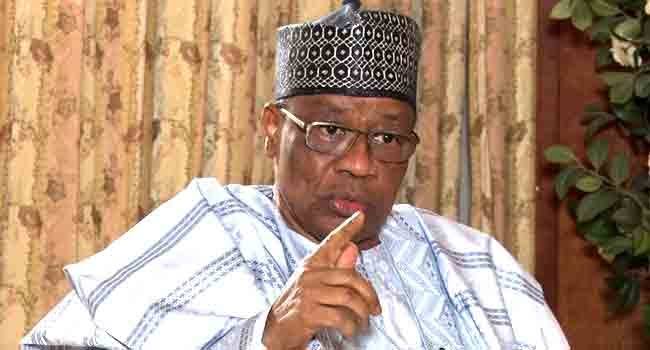
Why we removed Buhari’s Govt in 1985 through Military coup – IBB gives further revelations
Why we removed Buhari’s Govt in 1985 through Military coup – IBB gives further revelations
In a striking revelation, former military president General Ibrahim Babangida (retd) has shed light on the underlying cause of Major General Muhammadu Buhari’s ousting in 1985. According to Babangida, the removal of Buhari was a direct result of his tendency to personalize leadership during his time as Head of State.
Buhari, who initially came to power in a military coup in December 1983 that removed then-President Shehu Shagari, was himself toppled two years later. Babangida, who played a pivotal role in that power shift, shared insights in his book ‘A Journey in Service’, where he discussed the “holier-than-thou” mindset exhibited by both Buhari and his deputy, the late Brigadier Tunde Idiagbon. This approach, Babangida argued, alienated the military and the general public, pushing the nation to a critical tipping point.
Reflecting on the events that led to the 1985 coup, Babangida pointed out that Buhari’s leadership style not only distanced him from his own military constituency but also led to a breakdown in relations with the civil populace, which ultimately paved the way for his ouster.
His words: “The change in leadership had become necessary as a response to the worsening mood of the nation and growing concern about our future as a people. All through the previous day, as we flew from Minna and drove through Lagos towards Bonny Camp, I was deeply reflecting on how we as a nation got to this point and how and why I found myself at this juncture of fate. By the beginning of 1985, the citizenry had become apprehensive about the future of our country.
The atmosphere was precarious and fraught with ominous signs of clear and present danger. It was clear to the more discerning leadership of the armed forces that our initial rescue mission of 1983 had largely miscarried.
We now stood the risk of having the armed forces split down the line because our rescue mission had largely derailed. If the armed forces imploded, the nation would go with it, and the end was just too frightening to contemplate. Divisions of opinion within the armed forces had come to replace the unanimity of purpose that informed the December 1983 change of government.
In state affairs, the armed forces, as the only remaining institution of national cohesion, were becoming torn into factions; something needed to be done lest we lose the nation itself. My greatest fear was that division of opinion and views within the armed forces could lead to factionalisation in the military. If allowed to continue and gain root, grave dangers lay ahead.
“My predecessor in office, Major General Muhammadu Buhari, and his deputy, Brigadier Tunde Idiagbon, had separated themselves from the mainstream of the armed forces by personalising what was initially a collective leadership. They both posited a ‘holier than thou’ attitude, antagonising the civil populace against the military. Fundamental rights and freedoms were being routinely infringed upon and abused. As a military administration, we were now presiding over a society that was primarily frightened of us. We were supposed to improve their lives and imbue the people with hope for a better future.
“Instead, we ruled the nation with a series of draconian decrees. An administration intended to reflect the collective will of the armed forces as a national institution came to be seen as the private personal autocracy of a stubborn few. Like most military coups, our leadership change was informed by widespread disquiet among the civil populace. Ordinary people were experiencing severe economic hardship. The general economic and social conditions the people lived under were worsening by the day.
“Yet arbitrary controls in all aspects of economic life and an ancient resort to barter in international trade meant that the nation’s financial woes would not end soon. Draconian decrees led to the abuse and severe limitation of basic freedoms as people were clamped into indefinite detention, most times for minor infractions. Punishment for crimes against the state had led to the pursuit of mechanical legalistic justice against the dictates of natural justice. As the Chief of Army Staff, I was under undue pressure from the rank and file to seek ways of reconnecting the government to society lest we lose the nation itself.
“On several occasions and instances, even the very integrity of the armed forces was being called into question. A disciplinary case involving allegations of divided interest against some senior officers was decided without due recourse to the Army Council. Instead of waiting for a report and investigation from the Army leadership, the affected officers were unceremoniously relieved of their commission, and their military career of so many years was abruptly ended without any input from the Army as their institution of origin. I objected to this arbitrariness and disregard for due process. I confided in some senior colleagues that I would rather resign my commission than continue in office as Chief of Army Staff without input into decisions that concern the careers of personnel under my command.
“In response, I was placed under surveillance, with the privacy of my communications and those of my family constantly monitored. This tense atmosphere culminated in the unanimous decision of a broad spectrum of senior and middle-level officers to change the nation’s leadership. The processes associated with this change were completed without bloodshed by midnight on August 26, 1985. ON AUGUST 27, 1985, I assumed office as the nation’s new leader, fully aware of the many challenge confronting the country. I had no illusions about the direction in which to move the country. I had long-standing convictions about Nigeria born of many decades of comprehensive consultations with a broad spectrum of compatriots from nearly all walks of life. Having been part of all previous government changes, I had become quite familiar with the wishes and aspirations of our people and developed a template of what needed to be done, at least from my modest perspective. The new administration’s determination was informed by a genuine desire to end the cycle of instability in both the politics and general history of the nation. I made this clear in my inaugural address to the nation.”
News
Governor donates N9 million to wives of fallen soldiers
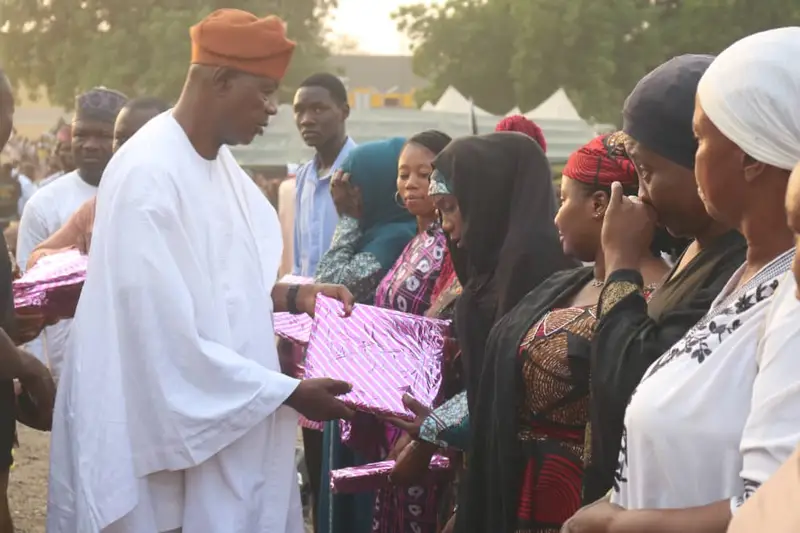
Governor donates N9 million to wives of fallen soldiers
Gov. Ahmed Ododo of Kogi, has announced the donation of Nine million naira to nine widows of fallen soldiers during the West African Social Activities (WASA) 2025 festivities.
The ceremony, held at the 12 Brigade headquarters, Chari‑Maigumeri Barracks, Lokoja, brought together military personnel, community leaders, and families of service men, who have paid the ultimate price for Nigeria’s security.
Represented by the State Security Adviser, Jerry Omodara the governor reaffirmed his Administration’s commitment to supporting Nigerian Army and security agencies.
Rep of Gov. Ahmed Ododo, the State Security Adviser Cdr Jerry Omodara (rtd), presenting gifts to wives of fallen soldiers at the 12 Brigade’s Nigerian Army WASA 2025, held at Chari Maigumeri Barracks Lokoja
He described the initiative as a moving gesture underscoring the state’s gratitude for the ultimate sacrifice made by its military families.
Ododo, serving as Special Guest of Honour, praised the 12 Brigade’s WASA describing it as a vibrant showcase of Nigeria’s cultural heritage.
“The event is a vital morale‑boost for troops who have spent the year on operations, training and community security.
“The annual WASA tradition has been “impressively sustained” and provides soldiers a chance to unwind with families after a demanding year,” he said.
He traced WASA’s roots to the West African Frontier Force, the predecessor of the Nigerian Army, emphasising its role in fostering unity, camaraderie and a sense of belonging among officers, soldiers and their dependents.
The governor lauded the colorful performances by various cultural troupes, saying the displays proved that “you have not broken links with your cultural backgrounds.”
He congratulated the brigade for successful 2025 operations that kept peace and security across Kogi, urging personnel to remain “focused, resilient and proactive” as they enter 2026.
Ododo reaffirmed the state’s commitment to supporting the Nigerian Army and other security agencies, promising continued assistance to improve welfare and operational effectiveness.
Earlier, the Commander, 12 Brigade, Nigerian Army, Brig. -Gen. Kasim Sidi, had assured Kogi of the army’s commitment to maintaining peace and security.
He described WASA as a significant occasion that brought together officers, soldiers, families, and friends to celebrate shared identity, cultural heritage, and collective achievements.
The commander praised the dedication, discipline, and professionalism of officers and soldiers, highlighting the Brigade’s achievements in 2025, including successful military operations against bandits and kidnappers in Kogi. (NAN)
News
Notorious Drug Kingpin who killed three NDLEA operatives 12-years ago arrested
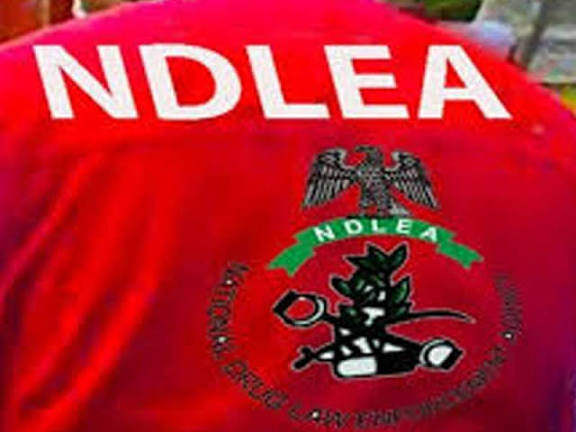
NDLEA arrests wanted drug kingpin, recovers illicit drugs from his hideout
Operatives of the National Drug Law Enforcement Agency (NDLEA) have successfully apprehended a long-wanted drug kingpin, ending a 12-year manhunt following his involvement in the brutal killing of three NDLEA officers.
This is contained in a statement by the Director, Media and Advocacy NDLEA, Mr Femi Babafemi on Sunday in Abuja.
Babafemi said that the suspect was notorious for drug trafficking, evading arrest and mobilising armed thugs against security agents.
He said that the suspect was on Friday, Jan. 16 tracked to his hideout in Owode town, Ogun State by tactical teams of the agency following credible intelligence.
He also said that during the clinical operation, the suspect was found in possession of 69 kilograms of skunk, a strain of cannabis.
He added that the arrest marked a significant breakthrough in the agency’s commitment to ensuring that no fugitive, regardless of how long they evaded justice, remained beyond the reach of the law.
“The suspect’s criminal history is marked by extreme violence and lawlessness.
“As a result, he had on June 15, 2014 orchestrated a barbaric mob action against a team of NDLEA officers who had attempted to arrest him at his enclave.
“The attack resulted in the cold-blooded murder of three NDLEA officers, including Rabiu Usman Kazaure and two others, who were killed by armed thugs mobilised by Jimoh.
“While the suspect managed to escape the scene that day, the agency remained resolute in its pursuit of justice for the fallen heroes,” he said.
In another encounter with the suspect on Aug. 12, 2023, when NDLEA operatives stormed his residence in Ado-Odo town, Ogun state, he managed to escape.
Babafemi however, said that the operatives succeeded in recovering 139 sacks of skunk with a total weight of 1,922 kilograms.
This, he said was following assets forfeiture proceedings instituted in court by the agency, the house in Ado-Odo, which served as a warehouse for his illicit drug trade, has since been finally forfeited to the Federal Government.
While commending the officers and men of the Ogun command for the arrests and seizures, the NDLEA Chairman, retired Brig. Gen.-Buba Marwa acknowledged their commitment.
Marwa enjoined them as well as their colleagues nationwide to maintain the current tempo of their balanced approach to the Agency’s drug control efforts.
He described the arrest of the wanted drug kingpin as a triumph of justice and a testament to the agency’s long memory.
He added that the arrest sends a clear and unambiguous message to all drug barons and fugitives.
“You may run, and you may hide for a season, but the long arm of the law will eventually find you.
“The arrest is particularly significant because it closes a painful chapter that began on June 15, 2014.
“For twelve years, this individual lived with the blood of our gallant officers on his hands. He mistakenly thought that time had erased his crimes.
“Today, we have proven that the NDLEA does not forget its own. We do not forget the sacrifices of those who laid down their lives in the service of our fatherland.
“This arrest is for the families of those three officers who have waited 12 years for justice”, Marwa said in a tribute to the officers lost over a decade ago.(NAN)
News
Food prices crash further in major Markets, as Residents call for sustainability

Food prices crash further in major Markets, as Residents call for sustainability
Prices of some food items have further dropped across markets in the Federal Capital Territory (FCT), Abuja, as residents welcomed the development.
A market survey conducted by the News Agency of Nigeria(NAN) across major markets in the FCT showed that while prices of several staples declined after the festive season, some food items remain expensive.
Some residents who spoke to NAN said the drop in prices had brought some relief but urged the government to ensure sustainability, as many households were still constrained by low purchasing power.
Latest food inflation statistics released by the National Bureau of Statistics (NBS) showed that Nigeria’s food inflation rate dropped in December 2025.
According to the NBS, food inflation stood at -0.36 per cent on a month-on-month basis, representing a decrease of 1.49 percentage points compared to the 1.13 per cent recorded in November 2025.
The bureau attributed the decline to a reduction in the average prices of items such as tomatoes, garri, eggs, potatoes, carrots, millet, vegetables, plantain, beans, wheat grain, ground pepper and fresh onions, among others.
At Garki Model Market, NAN observed notable price drops in several food items between November 2025 and January 2026.
A dustbin basket of big red tomatoes is being sold for between N5,000 and N5,500, as against N6,000 to N7,000, while a dustbin basket of shombo dropped to N3,000 from N4,500 to N5,000 recorded between November and December.
Similarly, a dustbin basket of fresh pepper dropped significantly, falling from between N4,500 and N5,000 to about N2,500, while tatashe dropped from between N5,000 and N6,000 to N3,000.
A dustbin basket of onions is being sold for N4,000 compared to N4,500 previously, and sweet potatoes dropped to between N1,000 and N1,800 from N3,000.
However, Irish potatoes recorded a sharp increase, increasing from 5,000 to N6,000 to between N9,000 and N10,000 per dustbin basket.
Rice prices remained relatively stable, with a 50kg bag of local rice selling for between N52,000 and N57,000, while foreign rice is being sold for N64,000. A 25kg bag of local rice is being sold for between N25,000 and N28,000.
At Nyanya Market, a dustbin basket of tomatoes sold for between N2,000 and N3,000, as against N4,000 during the festive season.
Onions dropped to N3,300 to N4,000 from N5,000 for a dustbin basket, while five medium-sized yam tubers now sell for between N4,500 and N5,000 compared to N5,000 to N7,500 previously sold.
One mudu of brown beans dropped from N1,000 to N700.
In Gwagwalada Market, food prices recorded a slight drop after the festive season, though many staples remained expensive.
A 50kg bag of foreign rice, which sold for N70,000 to N75,000 during Christmas, is now sold for between N65,000 and N70,000, while local rice dropped from N68,000 to between N62,000 and N66,000.
A medium-sized yam tuber dropped slightly from N4,000 to about N3,500.
The price of a live chicken dropped from between N20,000 to N25,000 to between N16,000 and N19,000, while a kg of cow beef dropped to N9,000 from N10,500. Frozen fish prices, however, remained unchanged.
At Apo Resettlement Market, prices of tomatoes, pepper and sweet potatoes declined, while onions and beef remained largely stable.
A dustbin basket of big red tomatoes dropped to between N3,500 and N4,000 as against N5,000 to N6,000, and tatashe dropped to N4,000 and N4,500 as against N5,500 sold during the festive period.
Pepper dropped significantly from N4,500 to N2,500 for a dustbin basket, as well as sweet potato, which dropped from N2,500 to N1,500, while a kg of beef remained at N8,000.
At Orange Market, Mararaba, NAN observed a sharp decline in the prices of tomatoes and pepper.
A big basket of tomatoe Jos dropped from between N23,000 to N25,000 to between N10,000 and N11,000, while fresh pepper dropped to N10,000 from N15,000.
Prices of beans, however, remained unchanged at between N750 and N800 per mudu.
Dei-Dei Market also recorded significant price reductions.
A big basket of derica tomatoes known as tomatoe Jos is presently being sold for between N8,000 and N12,000, as against N25,000 to N28,000, while a 50kg bag of fresh pepper dropped sharply to between N15,000 and N20,000 from N60,000.
A dustbin basket of sweet potatoes dropped to N1,000 as against N2,500 to N3,000 it was previously sold.
In Karu and Lugbe markets, prices of garri, beans, tomatoes and yams also eased, while Orozo Market recorded a rise in the price of brown beans, with a bag increasing from N42,000 to N49,000.
In Karu, five big yam tubers are being sold for between N8,000 and N10,000, as against N12,000 and N14,000, while in the Lugbe market, five medium-sized tubers of yams are being sold at N7,000 as against N10,000.
At Wuse Market, prices remained higher compared to other markets surveyed, though slight reductions were recorded in tomatoes, pepper, onions and tatashe.
A dustbin basket of Tatashe is selling for between N5,000 and N6,000 as against N7,000 and N8,000 while tomatoes are selling for between N7,000 and N7,500 as against N7,500 and N8,000.
A dustbin basket of fresh pepper dropped from N5, 000 and N6,000 to between N4,000 to N4,500
Some traders attributed the post-Christmas price drop to reduced consumer spending in January and increased supply from harvests.
A tomato trader at Garki Market told NAN that more customers were now buying full baskets due to lower prices, although many still bought smaller quantities because of limited funds.
Cyril Okocha, a businessman said the fluctuations were largely seasonal, noting that crops such as tomatoes, peppers and onions could become expensive during off-season periods.
According to him, the main challenge is not just food prices but low income and irregular salary payments.
“Many workers are underpaid, salaries are not indexed to inflation, minimum wage is not fully implemented across states, and some workers are not paid regularly.”
“To ensure sustainability of food prices, the government should encourage dry season farming, improve food availability, security, regulate prices, and boost incomes, these are also essential to easing the cost-of-living crisis.”
Some residents also shared similar views. Yemisi, a civil servant, expressed satisfaction with the drop in prices of items such as tomatoes, pepper, rice and beans, but urged the government to ensure sustainability.
“The reduction is encouraging, but many people still cannot afford these items. Government should ensure the prices are sustained,” she said.
A security guard, Mohamed Gobiri, described the price drop as a welcome development, especially for rice, and appealed to the government to further ease food costs.
Meanwhile, farmers and agricultural experts have urged the Federal Government to adopt deliberate and long-term policies to sustain the decline in food prices.
Kabir Ibrahim, President, All Farmers Association of Nigeria (AFAN) said the current drop in food prices was largely driven by harvest-season factors and warned that prices could rise again without structural improvements.
Experts also recommend addressing insecurity, foreign exchange challenges and transportation costs to curb food inflation and ensure sustainable food security. (NAN)
-
6 years ago
Our situation in Kano terrible – Gov Ganduje cries out
-

 News12 months ago
News12 months agoFG pledges commitment to enhance Police officers Welfare, implement Tinubu’s 8-point agenda for NPF
-
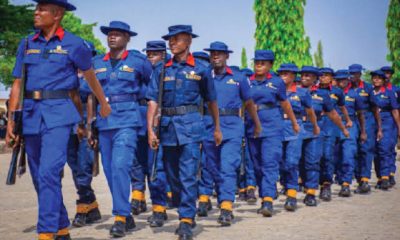
 News11 months ago
News11 months agoBREAKING; NSCDC gets approval to commence 2025 recruitment exercise
-

 News9 months ago
News9 months agoAlleged cocaine deal: Court issues orders in suspended DCP Abba Kyari’s case
-
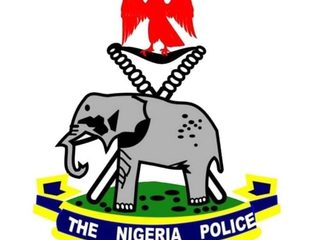
 News12 months ago
News12 months agoDPO under investigation for allegedly taking teenage girl to his home while in police custody
-

 News12 months ago
News12 months agoJUST IN; Commissioner of Police bows out of Service
-

 News9 months ago
News9 months agoJUST IN; Police Inspector dies watching Arsenal match
-

 News12 months ago
News12 months agoBREAKING; NLC declare nationwide protest


